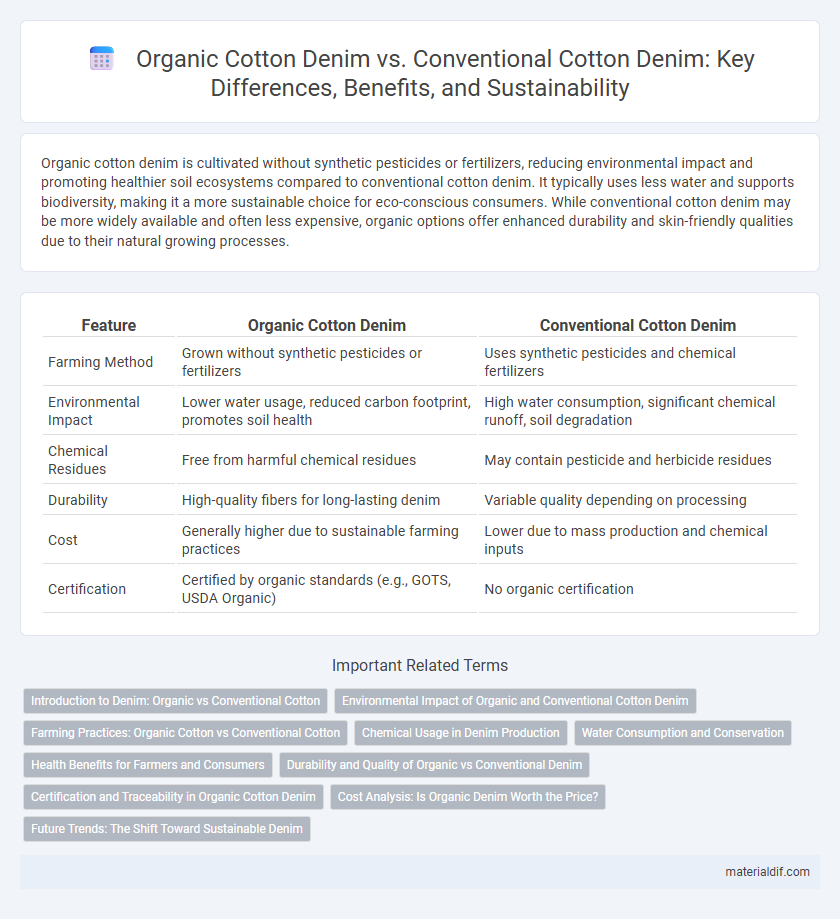Organic cotton denim is cultivated without synthetic pesticides or fertilizers, reducing environmental impact and promoting healthier soil ecosystems compared to conventional cotton denim. It typically uses less water and supports biodiversity, making it a more sustainable choice for eco-conscious consumers. While conventional cotton denim may be more widely available and often less expensive, organic options offer enhanced durability and skin-friendly qualities due to their natural growing processes.
Table of Comparison
| Feature | Organic Cotton Denim | Conventional Cotton Denim |
|---|---|---|
| Farming Method | Grown without synthetic pesticides or fertilizers | Uses synthetic pesticides and chemical fertilizers |
| Environmental Impact | Lower water usage, reduced carbon footprint, promotes soil health | High water consumption, significant chemical runoff, soil degradation |
| Chemical Residues | Free from harmful chemical residues | May contain pesticide and herbicide residues |
| Durability | High-quality fibers for long-lasting denim | Variable quality depending on processing |
| Cost | Generally higher due to sustainable farming practices | Lower due to mass production and chemical inputs |
| Certification | Certified by organic standards (e.g., GOTS, USDA Organic) | No organic certification |
Introduction to Denim: Organic vs Conventional Cotton
Organic cotton denim is produced using farming methods that avoid synthetic pesticides and fertilizers, promoting environmental sustainability and reducing chemical exposure. Conventional cotton denim relies on intensive chemical inputs, leading to higher water consumption and greater ecological impact. Choosing organic cotton denim supports eco-friendly practices and often results in softer, more breathable fabric compared to conventional cotton denim.
Environmental Impact of Organic and Conventional Cotton Denim
Organic cotton denim significantly reduces environmental impact by using 91% less water and eliminating harmful synthetic pesticides compared to conventional cotton denim. Conventional cotton denim relies heavily on chemical fertilizers and pesticides, contributing to soil degradation, water pollution, and greenhouse gas emissions. Sustainable practices in organic cotton farming promote biodiversity and improve soil health, making it a more eco-friendly choice for denim production.
Farming Practices: Organic Cotton vs Conventional Cotton
Organic cotton denim relies on farming practices that exclude synthetic pesticides and fertilizers, promoting soil health through crop rotation and biodiversity, which reduces environmental impact. Conventional cotton denim production typically uses chemical-intensive methods including synthetic pesticides, fertilizers, and genetically modified seeds, contributing to soil degradation and water pollution. These contrasting practices influence the sustainability profile of the denim, with organic methods prioritizing eco-friendly and regenerative agriculture.
Chemical Usage in Denim Production
Organic cotton denim uses significantly fewer pesticides and synthetic fertilizers compared to conventional cotton denim, reducing the environmental impact of chemical runoff and soil degradation. Conventional cotton denim production relies heavily on chemical herbicides, insecticides, and fertilizers, which contribute to water pollution and pose health risks to workers. Choosing organic cotton denim supports sustainable agriculture practices by minimizing toxic chemical use throughout the denim manufacturing process.
Water Consumption and Conservation
Organic cotton denim significantly reduces water consumption by utilizing natural rainwater and efficient irrigation methods, consuming up to 91% less water than conventional cotton denim production. Conventional cotton denim relies heavily on intensive irrigation systems, often depleting local water sources and contributing to water scarcity. Choosing organic cotton denim supports water conservation efforts and promotes sustainable agriculture practices in the textile industry.
Health Benefits for Farmers and Consumers
Organic cotton denim reduces farmers' exposure to harmful pesticides and synthetic fertilizers, lowering risks of respiratory problems and skin conditions. Consumers benefit from organic cotton denim through softer fabrics free from toxic chemical residues, which minimize allergic reactions and skin irritations. Sustainable farming practices in organic cotton cultivation also contribute to healthier soil and water, promoting long-term environmental and community well-being.
Durability and Quality of Organic vs Conventional Denim
Organic cotton denim is often praised for its superior durability due to the absence of harsh chemicals, which preserves the natural strength of the cotton fibers. Conventional cotton denim, while widely available, may undergo extensive chemical treatments that can weaken fiber integrity over time, affecting longevity. Quality-wise, organic denim tends to offer a softer texture and better wear resistance, making it a more sustainable and premium choice for long-lasting denim garments.
Certification and Traceability in Organic Cotton Denim
Organic cotton denim is certified by rigorous standards such as GOTS (Global Organic Textile Standard) and OEKO-TEX, ensuring chemical-free farming practices and sustainable processing. These certifications provide full traceability of the cotton from seed to finished fabric, guaranteeing transparency and environmental responsibility. Conventional cotton denim often lacks such detailed traceability and sustainability credentials, increasing environmental and social risks.
Cost Analysis: Is Organic Denim Worth the Price?
Organic cotton denim typically incurs higher production costs due to sustainable farming practices, lower yield per acre, and certification expenses compared to conventional cotton denim. While the price premium reflects environmental and social benefits, consumers must weigh these factors against their budget and long-term value, as organic denim often offers superior durability and reduced chemical exposure. Cost analysis reveals that investing in organic denim can be worthwhile for those prioritizing eco-friendliness and ethical manufacturing without compromising quality.
Future Trends: The Shift Toward Sustainable Denim
Organic cotton denim is gaining traction as the fashion industry prioritizes sustainability, driven by consumer demand for eco-friendly materials and reduced environmental impact. Future trends indicate a significant shift toward organic cotton denim, with innovations in water-efficient farming and non-toxic dyeing processes enhancing its appeal over conventional cotton denim. Brands investing in sustainable denim production are expected to lead the market, aligning with global efforts to reduce carbon footprints and promote circular fashion practices.
Organic Cotton Denim vs Conventional Cotton Denim Infographic

 materialdif.com
materialdif.com